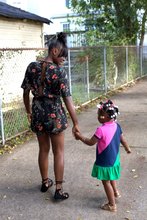Found 47 resources.
0
0
0
This week, the Food Research & Action Center in Washington, D.C., published its annual School Breakfast Scorecard, analyzing school breakfast participation throughout the country for the 2017-2018 school year. Here are six things to know from the report.
Topics: Early childhood, Education, Food insecurity, Health, Nutrition, Youth
 Shared by Housing Is
on Feb 25, 2019
Shared by Housing Is
on Feb 25, 2019 0
0
0

For many years, the vulnerabilities of children experiencing homelessness have been glossed over on the assumption that their innate resilience would overcome the impact of homelessness. As someone who worked in the field, I would often hear, “Oh, they’ll never remember.” Today we know better. We know more about how the brain develops and about how trauma impacts brain development. There is a growing recognition among providers that these early years are critical for establishing a foundation for emotional, mental, and physical wellbeing, and that we don’t get a second chance at early...
Topics: Early childhood, Education, Homelessness, Housing, Low-income, Research, Safety, Stability
 Shared by Housing Is
on Feb 21, 2019
Shared by Housing Is
on Feb 21, 2019 0
0
0
Times are changing rapidly for families—our households, work and the workforce do not look like they did just a decade ago. Challenges and barriers for parents continue to grow – skyrocketing costs of health care and child care, lack of flexibility at the workplace, and less time at home. Working parents have to balance their budget and time across an ever-changing landscape of needs: from caring for themselves, their children, and older family members, to affording quality child care and paying household bills. Removing barriers so families can care for their loved ones requires us to...
Topics: Child welfare, Dual-generation, Early childhood, Family engagement, Health, Legislation & Policy, Low-income, Preventative care
0
0
0
A Summary of Results from the MIHOPE and MIHOPE-STRONG Start Studies of Evidence-Based Home Visiting
A healthy birth and positive experiences in early childhood can promote health and development. One approach that has improved outcomes for children and their parents is home visiting, which provides individually tailored support, resources, and information to expectant parents and families with young children. This brief summarizes recently published reports from two national studies of evidence-based early childhood home visiting: the Mother and Infant Home Visiting Program Evaluation (MIHOPE) and MIHOPE-Strong Start.
Topics: Child welfare, Dual-generation, Early childhood, Home visiting, Metrics, Partnerships, Place-based, Preventative care, Research
0
0
0
Affordable housing campaigns are not new, of course, but what is unprecedented and transformative about Opportunity Starts at Home is the scope and diversity of the partners that are joining forces to advocate for more robust and equitable federal housing policies. The campaign is advised by a Steering Committee including leading national organizations representing a wide range of interests that are working shoulder-to-shoulder to solve the affordable housing crisis.
Topics: Asset building, Child welfare, CLPHA, Community development, Early childhood, Education, Food insecurity, Funding, Health, Homelessness, Housing, Immigrants, Legislation & Policy, Low-income, Mobility, Out-of-school time, Partnerships, Racial inequalities, Safety, Seniors, Stability, Substance abuse, Youth
0
0
0
Teachers know that children learn better and are more likely to graduate when they live in a stable, affordable home.
Topics: Child welfare, Early childhood, Education, Housing, Partnerships, Youth
0
0
0

Since federal public housing assistance was first created in 1939 amid the Great Depression, public housing advocates have struggled with how to move low-income families to higher-opportunity neighborhoods, typically defined as neighborhoods with less poverty (though experts argue there are other ways to measure opportunity, including quality of schools and access to public transportation, and KCHA uses a broader “opportunity index” to compare locations). The Moving to Opportunity program, a federal demonstration in the 1990s, documented outcomes of families moving to neighborhoods with lower...
Topics: Child welfare, CLPHA, Early childhood, Education, Mobility, MTW, Pacific Northwest, Partnerships
0
0
0
According to the Institute for Women’s Policy Research, 26% of undergraduate students--about 4.8 million students--are raising dependent children. Students of color are more likely to be parents; additionally, about 70% of parenting students are women. These students are balancing many competing demands: attending classes, keeping up with schoolwork, and caring for children. College and child care are costly, with the average cost of child care ranging between $8,000-$35,000 each year. As a result, parenting students are more likely to experience food and housing insecurity than students who...
Topics: Dual-generation, Early childhood, Education, Housing, Partnerships, Post-secondary, Youth
0
0
0

Women with children, especially, stay hidden in fear of losing custody of their children. As a result, we will never see them camping in tents or in downtown parks.
Topics: Early childhood, Homelessness, Housing, Legislation & Policy, Low-income, Safety, Stability
0
0
0
Housing quality, instability, and unaffordability threaten the well-being of millions of children across the nation. Research shows that housing is the first rung on the ladder to economic opportunity and that a person’s access to opportunity is intrinsically linked with that of the community where they live. As home prices increase, the gap between rents and incomes continues to widen, and nearly half of today’s renters are cost burdened. Child welfare professionals, educators, and pediatricians can strengthen their work by understanding the central importance of housing as a determinant of...
Topics: Child welfare, Early childhood, Health, Housing, Research, Safety
0
0
0
Stricter work requirement policies for the Supplemental Nutrition Assistance Program (SNAP) at the federal level were left out of the recently passed farm bill, but state policymakers are still considering whether to expand or establish their own work requirements for SNAP and Medicaid, with the goal of incentivizing employment. There’s no question that good jobs help spur upward mobility. But if we are serious about helping people work, we have to get serious about helping people improve their skills.
Topics: Child welfare, Cost effectiveness, Dual-generation, Early childhood, Food insecurity, Legislation & Policy, Low-income, Research, Stability, Workforce development
0
0
0
Using a two-generation (2Gen) framework, Medicaid can be designed to support the social capital, health and well-being, educational attainment, and economic security of children and families, together, so they can maximize their health and thrive. This checklist outlines specific Medicaid policies and design choices adopted in Colorado to implement a 2Gen approach to improve the lives of children and families.
Topics: Dual-generation, Early childhood, Family engagement, Health, Low-income, Medicaid / Medicare
0
0
0
Shining a light on supportive approaches to noncustodial parenting, specifically by looking at Colorado’s successful CO-PEP program.
Topics: Dual-generation, Early childhood, Family engagement, Partnerships
0
0
0
With collectively more than 100 years of policy expertise and values-based leadership between us, Ascend at the Aspen Institute and the Housing Opportunity and Services Together initiative at the Urban Institute partnered to develop a set of recommendations on how to harness assisted housing and public-private housing partnerships for better outcomes for families.
Topics: Dual-generation, Early childhood, Education, Family engagement, Health, Housing, Low-income, Place-based, Research, Stability
0
0
0
The health care system is transforming to deliver value and maximize health across a patient’s lifespan. In this new landscape, there is rapid adoption of health technology to deliver patient-centered, whole person care. This issue brief explores elements for technology applications emerging to “close the loop” between clinical and community services and presents accelerators and challenges to their adoption.
Topics: Child welfare, Data sharing, Early childhood, Health, Partnerships, Youth
0
0
0
Young people are the workers of today and tomorrow. But those who become parents in their teenage years and early 20s, just as they are getting started in the world of work, are often confronted with a harsh reality: odds stacked against their ability to earn, learn and raise a family, which can threaten their children’s future as well as the strength of our communities.
Topics: Early childhood, Education, Legislation & Policy, Post-secondary, Pre-natal, Research, Workforce development, Youth
0
0
0
This short document provides basic information to help housing and homeless assistance providers advocate with their families and youth for appropriate educational services, from birth through higher education. The rights and protections outlined here apply to all children and youth experiencing homelessness, as defined by the education subtitle of the McKinney-Vento Act.
Topics: Child welfare, Early childhood, Education, Homelessness, Legislation & Policy, Low-income, School-readiness
 Shared by Housing Is
on Aug 9, 2018
Shared by Housing Is
on Aug 9, 2018 0
0
0
Topics: Child welfare, Dental, Early childhood, Education, Exercise, Family engagement, Health, Housing, Medicaid / Medicare, Mental health, Nutrition, Partnerships, Place-based, Preventative care, Seniors, Vision
 Shared by Housing Is
on Jul 12, 2018
Shared by Housing Is
on Jul 12, 2018 0
0
0
Community organizations are improving health equity by tackling the cycle of poverty in urban neighborhoods.
Topics: Asthma, Child welfare, Community development, Early childhood, Exercise, Family engagement, Health, Low-income, Medicaid / Medicare, Midwest, Nutrition, Obesity, Out-of-school time, Partnerships, Preventative care, Racial inequalities, Research, Safety, Youth
 Shared by Housing Is
on Jul 11, 2018
Shared by Housing Is
on Jul 11, 2018 0
0
0
Topics: Child welfare, Early childhood, Education, Mental health, Post-secondary, Research, Safety, South, Youth
 Shared by Housing Is
on Jul 5, 2018
Shared by Housing Is
on Jul 5, 2018 0
0
0

Poor children don't struggle in school because of their parents. They struggle because of poverty.
Topics: Attendance, Child welfare, Dual-generation, Early childhood, Education, Family engagement, Food insecurity, Grade-level proficiency, Housing, Legislation & Policy, Literacy, Low-income, Out-of-school time, Post-secondary, Racial inequalities, Research, School-readiness, Youth
0
0
0
A reading program designed to help men become better fathers is associated with better parenting skills as well as behavior and learning improvements in kids, a small study suggests.
Topics: Early childhood, East Coast, Education, Family engagement, Literacy, School-readiness
 Shared by Abra Lyons-Warren
on Feb 6, 2017
Shared by Abra Lyons-Warren
on Feb 6, 2017 
